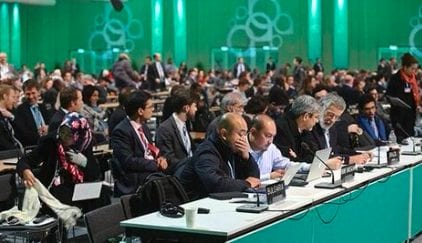After a dramatic UN Climate Summit, Australia faces key tests of it climate resolve from early 2014, which should drive a rethink of its approach to global climate engagement and action.
At the start of these negotiations Australia put a match to brittle international climate trust and ambition. The Government appeared to backtrack on 2020 emissions reduction commitments of up to 25 per cent. It made inflammatory remarks about core international climate financing principles and institutions. And it took difficult, if not obstructive, positions in negotiations.
These actions pushed Australia to or beyond the margins of climate credibility and global citizenship, attracting direct or thinly veiled criticism from many from China to South Africa to Pacific Islands to Europe.
Further fuel was then added by Japan’s reversal on its emissions reduction pledge and controversial actions from coal-dependent host Poland all of which combined to provide a near poisonous negotiating atmosphere.”
In the end, agreement was struck on a roadmap to the 2015 agreement, small but important steps towards a “loss and damage” mechanism to help vulnerable countries address unmanageable climate impacts, and a mixed bag on financing investments for low emissions and climate resilient development in poorer countries.
Interestingly, Australia didn’t withdraw formal support for its second commitment under the Kyoto Protocol, nor its formal emission reduction pledges of up to 25 per cent or their conditions shared at previous summits.
The outcomes aren’t perfect, but they mean Australia faces expectations to increase pre and post 2020 actions with key tests of its climate resolve and credibility in 2014 and early 2015 including (but not limited to):
April 2014 – indications for increased ambition on Kyoto emission reduction commitments related to our minimum 5 per cent target recently deemed “inadequate” by the Climate Change Authority
June 2014 –a ministerial meeting of Kyoto countries to consider & implement increased commitments
September 2014 – a world leaders meeting at the U.N. hosted by Secretary General Ban-Ki Moon with the specific purpose of increasing ambition on climate action, where countries are also invited to put forward pre and post 2020 targets – where the Government should put Australia’s forward.
December 2014 – the next annual UN Climate Summit which will need to agree key aspects of the 2015 agreement & how to review pledges for sufficiency against avoiding global warming of more than 2 degrees
2015 – end of April is the final date for countries like Australia to detail potential reduction targets and financing contributions ahead of the December meeting scheduled to resolve an agreement .
With the framework of REDD+ now complete – including methodological guidance for the Green Climate Fund (GCF) to spend money on reducing deforestation – the Government needs to reconsider its withdrawn support for the GCF if it takes rainforest protection seriously.
During these negotiations Australia has damaged its reputation not just as a responsible climate player but as a credible global citizen. After Warsaw, Australia now faces many tests of its climate resolve and global citizenship.
John Connor is CEO of The Climate Institute and attended the Warsaw negotiations.










